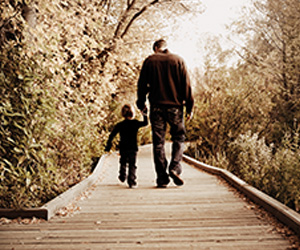The involvement of a father, or positive male role model, makes a profound impact on the life of a young child. Ciska Thurman asks an expert how to be the best dad you can be
 So much surrounding the ‘traditional’ family dynamics has been changed. A nuclear model of mom, dad, two kids and a dog is obsolete. Parenting roles have become less distinct, with more equal, fair expectations of men and women.
So much surrounding the ‘traditional’ family dynamics has been changed. A nuclear model of mom, dad, two kids and a dog is obsolete. Parenting roles have become less distinct, with more equal, fair expectations of men and women.
Same-sex parenting partnerships, step-parents, single-parent families or child-headed households – these models rely on a sound parenting presence, free of the constraints of gender or outdated assumptions about earning potential.
It is essential, then, that fathers decide their own fathering destiny. In other words, they should parent not according to outdated dad-only-zones (discipline, distance and dirt), but according to the full range of what only they can offer.
Voice of reason
Alan Hosking is an authority on parenting with a focus on first-time parents, and the author of best-seller What Nobody Tells a New Father. He affirms: ‘We all parent differently, largely influenced by the way each of us was brought up. It is important, therefore, for parents to allow their partners to be themselves and parent in a way that’s comfortable for them, while agreeing on certain ways of doing things in the interests of the children.’
Dad ideals
Upbringing and personality aside, Alan does attribute some positive general characteristics to fathers, in comparison to mothers. Firstly, ‘fathers tend to be a little bit more relaxed when responding to their children’s needs’ (versus mothers, who are often driven initially by newborn hormones). Conscious or not, ‘this goes some way towards teaching delayed gratification – a critical lesson for succeeding in life’. Secondly, ‘fathers generally take bumps and scratches a lot less seriously than mothers would. They may gloss over such things, teaching the children to handle the little knocks that come their way in life.’
Alan also outlines the following timeless qualities of a good father:
1 He leads by example.
2 He shows love and respect for his co-parent, even in the face of parental conflict or a breakdown in the relationship.
3 He loves his kids unconditionally, accepting them for who they are and not what they can do.
4 He seeks to influence his children, but not control them.
5 He teaches them to take respon-sibility for their words and actions.
6 He models emotional intelligence and compassion for others.
Impact report
The influence of a father (biological, step-father or father-figure) is most evident in the healthy self-esteem of a child. Seeing and accepting children for who they are (and not for the goal or grade they scored) builds an affirming self-image. In turn, this results in children who are:
• supportive friends – they have a foundation for building healthy adult relationships
• motivated to achieve at school or in their area(s) of interest
• sensitive to the needs and plight of others
• increasingly independent and confident in themselves
• less likely to abuse drugs or commit crime.
Alan argues that such children grow up to lead happy, successful and fulfilled lives, and make the world a better place for everyone.
Finally, however, it is important for parents to embrace the principles of ‘good-enough parenting’. As parents today are often subject to enormous amounts of confusion, ridicule, judgement and frustration, they want to be perfect. Good-enough parenting concedes that parenting is difficult and complex, and that given our fallible nature, we will make mistakes in raising our children. These mistakes, however, should not necessarily cause much trauma or damage the malleable, emerging personalities of our kids. If your children can grow up to be functional and adaptive, can work and love, then you have been a good enough parent!
Famous fathers have their say
‘Every day I’m proud to be a dad.’ – Chris Rock
‘I was angry and frustrated until I started my own family and my first child was born. Until then I didn’t really appreciate life the way I should have.’ – Johnny Depp
‘I cannot understand how I managed to cope without getting cuddled this many times a day.’ – Russell Crowe
‘Men should always change diapers. It’s like washing dishes, but imagine if the dishes were your kids, so you really love the dishes.’ – Chris Martin







